#which is broadly true!
Text
I'd hate if my psychiatrists were right and a marginally higher dose of stimulant could trigger a manic episode while still not even fixing my symptoms
#feeling strangely like buzzed the past week or so#like stimulant buzzed but like I started this dose a month ago and I don't even take it every day but this held true regardless#sleep all fucked#and let's be real I have done way too much going out and meeting new people for like#who I am as a person. lmao#which has been a symptom previously#m#ref notes#oh yeah I had that post the other day about oh randomly I am weirdly happy...#I still feel broadly fine though#am I talking a lot? I feel like I'm talking a lot. like there's more words in my head than usual
9 notes
·
View notes
Text
In all seriousness, when I was in my 20s I spent way too much time reading tumblr and trying to figure out the right opinions to have on everything. It was pretty soul destroying now that I look back.
#although the people i consider my people (leftists and the left leaning) are always turning on people for slight disagreements#so i guess it was self preservation in a way#luckily i basically never posted back then only read#the truth is a lot of the disagreeing and fucking infighting on the left is internet sickness#and a lot of people who seem to know what they are talking about on here are actually talking out of their ass- seriously.#they don't need to know what they are talking about because everyone reading knows even less#my criteria for which leftists i respect is 'can they handle a slight disagreement with someone broadly on their side-#do they engage in good faith or do they mock and belittle?'#and i understand anyone on here with over a certain amount of folllowers who talks about politics will get bait and bad faith asks and stuf#i'm not saying you have to engage with bait in good faith!#just the real stuff.#i kind of regret this now but i engaged on a post that was using the word liberal in the coloquial (meaningless) tumblr way#that was when someone i followed (unfollowed now) apologised to the op of the post for my dumb idiocy- i was like ohhhhh#and then the op of the post responded to me like 'i'm using the true definition of liberal! which is: [really confusing explanation]'#the truth is there is no one definition because the left and right use it differently#when the right says liberal in a derogatory way they don't mean 'not those further left people though! they are really respectable + cool'#nah they mean the further left also#the point is the term liberal has no set meaning- it changes with context and no one bothers providing the context#i will stop now this is too rambly even for me
6 notes
·
View notes
Text
it is interesting to me that ive seen lately (n yknow this is subjective and likely not any real social force just what ive seen) many queer people simultaneously talking about taking back and embodying unpalatable and ‘unmarketable’ queerness (the recent return to the terms faggot and transsexual come to mind) which i think is pretty evidently shaped by the conservative moment were in of demonizing queer ppl and especially gnc and trans people as predators--it reads as a return to queer isolationism in the face of external hostility, imo--while at the same time ive seen a lot of rallying around the “original” 6 stripe rainbow flag as opposed to any of the purportedly ‘factional’ flags of different queer identities, with the assumption being different identity flags divide us while the rainbow flag encompasses everyone and its kinda fascinating to me bc the rainbow flag is probably the single most marketable and palatable and uncontroversial symbols of queerness which has been seamlessly uptaken by those who wish to sell it back to us as gets pointed out every pride month with all the cringey pride merch....
i dunno you could maybe take that as a point of hypocrisy and claim the queer community is itself in a conservative moment rn where its returning to a sense of history and historical continuity (perhaps even out of that sense of external threat) or even that the queer community has for some time been in a conservative moment given the like, decade of identity discourse and lashing out at any people deemed to not have a sufficiently established history or however we should categorize the bihets/ace discourse/transtrender-tucute discourse/pan discourse/bi lesbians discourse (because lets be frank its essentially all the same discourse just keeping up its momentum by leapfroging from one target to the next) which i think is, like, SOMEWHAT true but not entirely?
its more interesting to me, in any case, as an expression of a conflict the queer community is facing given that current state of affairs RE antitransness and that very recent history. like, the simultaneous need to retreat to a safe sense of community which is welcoming to the very things the outer world is demonizing ie mutable gender, complex or contradictory experiences of gender, gender expression which is hostile to the cis binary, but also the ways in which it has to grapple with those discourses which have largely defined the community infighting for again the past decade. its queer people begging the question ‘how can we make the queer community welcoming to the girlfags and genderfucks and tboys who are being threatened when we have spent so much time making the queer community a hostile place for anyone with a non-conventional or not easily (or even just palatably) sortable sense of queer identity’. and the answer it seems to be grappling with at the moment is like, welcoming all that diversity of experience but being absolutely averse to naming it. yes we love all the fuckery with gender and sexuality never be marketable but like, ew, why are you calling yourself [insert microlabel here]. you can be genderweird but you cant call yourself genderweird. you can only exist as queer in the broadest possible way (the all-inclusive gay pride flag!) but if you try to name the specifics or use those identity labels weve been fighting over for years youre doing it wrong (the progress pride flag is now ugly and cringey and ‘too much’). i think theres something also to the way (at least on this site) transmisogynistic discourses have really taken hold as legitimate (though yknow i wont downplay how much a problem transmisogyny has like. always been in queer spaces no matter what) in the name of protecting n defending trans people. like its just regurgitated transmisogyny but its being mobilized supposedly in the service of helping trans people. idk its definitely getting a little late for me to string this together fully coherently but theres a throughline there, in the ways certain ideas are being consolidated and reified as ‘yes were more progressive now!’ when i think theres definitely something to question there in terms of like...are we? are we actually? are we doing better by the people were trying to help or are we setting strict standards and forcing ppl to adhere to them again?
#myposts#this is long and honestly probably Nothing#i dont even really have a way of proving its the same group of people saying both things except fro anecdotally seeing it#and even thats not proof either is a real social force with like power. i could be entirely wrong on every count here#but i do think theres something to the idea that like#as ive seen said#yknow 'ace discourse never ended you all just accepted ace people didnt deserve support and then moved on w those views internalized'#i think thats more broadly true for like. all those discourses i mentioned. and for the transmisogyny i alluded to#but honestly i dont even want to name the specific phenomenon im talking abt there bc those people. scare me.#but yknow ill say it ive felt way more pressure lately to not call myself pan than i did at the height of pan discourse#before it became cringe to care about it and instead of actively shitting on pan ppl we moved on to passively doing it#ive largely started just. calling myself bi to avoid the arguement. which i predicted i would have to do years ago#and now look at me doing it! not really a fluke that its happening now. i think#which isnt to say were moving 'backwards' per se but that these ideas are not now and never have been really challenged#so weve just internalized their logics--reactionary logics--and its having an interesting effect now that we need a progressive community#for our safety.#now we cant say anything about it because to bring it up is jeopardizing everything weve built and the people were keeping safe!#cause we dont count as people deserving of safety were disruptors who only belong when we dont make noise. idk. or thats how i feel#again i dont really know if this is true at all im more just...thinking through it i think#basically like what im seeing--i think--comes from simultaneously that need to be unmarketable in the face of hostility#coming into conflict with a decade of momentum to make queers solely marketable. and i think thats producing some interesting--but sucky#--discourses in the current moment#last disclaimer that i might and am likely totally wrong! okay lauren out. post send *nervous sweating*
21 notes
·
View notes
Text
I need to write the 'sometimes the specifics is the point' post sometime. every few days I read a post that makes me think that and it'd be really useful to have something written on hand
#my rambles#cliffs notes is that I've seen this impulse to understand everything as patterns online#because that type of understanding is very transferable which can be pretty useful given the firehose of diff topics you face online#but it only goes so far and often the specifics of the situation does significantly change things#and that's important to realise else you get folks like that one anon txttletale got sent who was like#'you support palestine yet you were against ukraine. strange! I am very smart'#i mean the bigger issue with that ask was that it was completely misrepresenting her points but you get what I mean#also part of my brain is tying this to badly done fanfic aus/homogenisation of chars by fandom (incorrect quotes)#but I haven't thought enough on that to decide if I'm pinning the issue right for that one#I mean that's true for this broadly - not sure if this is the most useful way to frame this - but this is why this isn't a full post!#rh
3 notes
·
View notes
Text
I think I have a blocked tear duct, and it’s taking so much for me to not jam a sharp implement into the corner of my eye to see if it will relieve the pressure
#it feels like if I did a bunch of pressurized goo would shoot out#which is—broadly—probably true but I don’t think it would help and would indeed be quite detrimental#<— talking myself off the ledge here
2 notes
·
View notes
Text
In recent posts I've complained that a lot of tabletop RPGs which toss around the term "fiction first" don't actually understand what it means, and I've been asked to expand on that complaint. So:
In my experience, there are two ways that game texts which want to position themselves as "fiction first" trip themselves up, one obvious and one subtle.
The first and more obvious pitfall is treating "fiction first" as an abstract ideology. They're using "fiction first" as a synonym for "story over rules" in a way that calls back to the role-playing-versus-roll-playing discourse of the early 2000s. The trouble is, now as then, nobody can usefully explain what "story over rules" actually entails. At best, they land on a definition of "fiction first" that talks about the GM's right to ignore the rules to better serve the story, which is no kind of definition at all – it's just putting a funny hat on the Rule Zero fallacy and trying to pass it off as some sort of totalising ideology of play.
A more useful way of defining "fiction first" play is to think of it not in terms of whether you engage with the rules at all, but in terms of when they're invoked: specifically, as a question of order of operations.
Suppose, for example, that you're playing Dungeons & Dragons, and you pick up the dice and say "I attack the dragon". Some critics would claim that no actual narrative has been established – that this is simply a bare invocation of game mechanics – but in fact we can infer a great deal: your character is going to approach the dragon, navigating any inclement terrain which lies between them, and attempt to kill the dragon using the weapon they're holding in their hand. The rules are so tightly bound to a particular set of narrative circumstances that simply invoking those rules lets us work backwards to determine what the context and stakes must be for that invocation of the rules to be sensical; this, broadly speaking, is what "rules first" looks like.
Conversely, let's say that your game of Dungeons & Dragons has confronted you with a pit blocking your path, and you want to make an Athletics check to cross it. At this point the GM is probably going to stop you and say, hold up, tell us what that looks like. Are you trying to jump across it? Are you trying to climb down one wall of the pit and up the other? Are you trying to tie a rope to the halfling and toss them to the other side? In other words, before you can pick up the dice, you need to have a little sidebar with the GM to hash out what the narrative context is, and to negotiate what can be achieved and what's at stake if you mess it up; this, broadly, is what "fiction first" looks like.
At this point I know some people are thinking "wait, hold on – both of those examples were from Dungeons & Dragons; are you saying that Dungeons & Dragons is both a rules-first game and a fiction-first game?" And yeah, I am. That's the second, more subtle place where game texts that talk about "fiction first" go astray: they talk about it as though being "fiction first" or "rules first" is something which is inherent to game systems as a whole.
This is not in fact true: being "fiction first" or "rules first" is something which describes particular invocations of the rules. In practice, only very simple games spend all of their time in one mode or the other; most will switch back and forth at need. Generally, most "traditional" RPGs (i.e., the direct descendants of Dungeons & Dragons and its various imitators) tend to operate in rules-first mode in combat and fiction-first mode out of it, though this is a simplification – when and how such mode-switching occurs can be quite complex.
Like any other design pattern, "fiction first" mechanics are a tool that's well suited for some jobs, and ill suited for others. Sometimes your rules are fine-grained enough that having an explicit negotiation and stakes-setting phase would just be adding extra steps. Sometimes you're using the outputs of the rules a narrative prompt, and having to pin the context down ahead of time would defeat the purpose. Fortunately, you don't have to commit yourself to one approach or the other; as long as your text is clear about how you're assuming a given set of rules toys will be used, you can switch modes as need dictates. However, you're not going to be capable of that kind of transparency if you're thinking in terms of "this a Fiction First™ game".
(Incidentally, this is why it can be hard to talk about "fiction first" with OSR fans if you're being dogmatic about fiction-first framing being an immutable feature of particular games. Since traditional RPGs tend to observe the above-described rules-first-in-combat, fiction-first-out-of-combat division, and OSR games tend to treat actually getting into a fight as a strategic failure state, a lot of OSR games spend most of their time in fiction-first mode. If you go up to an OSR fan and insist that D&D-style games can never be fiction-first, then attempt to define "fiction first" for them and proceed to describe how they usually play, they'll quite justifiably conclude that you have your head up your ass!)
#gaming#tabletop roleplaying#tabletop rpgs#game design#fiction first#violence mention#death mention#swearing
2K notes
·
View notes
Text
the logic of pathologizing specific desires claims to stop moralization, but all it does is qualify them using absurdly circular logic.
"people who do drugs/kill themselves/hurt themselves have Done Something Wrong. but thinking that they are Bad People is cruel [true!], so they must have had a disease that made them do a Bad Thing even though they're Not Bad." or, more broadly "Healthy People want to do Good Things + Stay Healthy while Unhealthy People want to do Bad Things + Stay Sick. therefore, someone is who wants to do Bad Things is sick with a disorder that is tricking them into thinking they want to do Bad Things instead of the Good Things that their Real Self (which is being obscured by disease) wants."
do you see how this classifies anyone who desires something "unhealthy" as diseased + denies them full personhood until they embrace an identity composed of only "healthy" desires (with all "unhealthy" desires being an invasive Other)? why do we see this as this necessary? would someone become a Bad Person if the desire to do drugs or kill themselves was coming from Them + not a disease? why, if you genuinely believe that these things are not immoral? or do you believe they are ONLY morally acceptable because they come from a disease (so the person "can't help it")? if you feel like you need this model to understand your own experience, why? do you feel like it relieves a shame or guilt surrounding your experiences? why?
i need everyone to understand that, regardless of whatever personal attachment you feel to this model, the circular concept of "people who are too sick to know what's good for them (which is obvious because they are making choices which only sick ppl make)" is part of a logic that justifies all manner of degrading, violent + carceral responses to mad ppl/drug users/unhoused ppl. for every "recovered" person who embraces this model, there is a "disordered" person who resents it + that person will forever be denied the resources + social absolution "recovery" offers until they embrace it
2K notes
·
View notes
Text
i'm surprised i haven't seen any text posts yet about the Unsubtle Differences between astarion’s tiefling party/high approval forest scene and the one you get after the goblin party.
there’s something so terribly interesting about how the conversation afterward plays out depending on which variation you pursue.
like, most people have seen the tiefling party version by now. astarion basking in the sunlight the morning after, playing off most of what tav says with relative ease, even when they ask about his scars and he tells them about cazador. his cadence is smooth and composed, his smile almost friendly, even though you know, as the viewer, he’s playing a game of manipulation at this point. the only real crack in his demeanor is if tav notices that cazador’s “poem” was written in infernal, which, understandably, startles him.
but recently i watched the goblin party version of this same scene, and everything reads so differently. unlike at the tiefling party, it’s still the middle of the night when astarion tries to leave, thinking tav is asleep—almost immediately after the act, in fact. when tav does speak to him, he’s visibly nervous, halting and stammering in the middle of lines delivered unflinchingly in the other version of the scene. he gestures broadly and fidgets more while talking, his smile comes and goes. there’s even some of his distinctive high pitched, fake laughter sprinkled throughout the exchange, almost identical to later scenes where he's very, very obviously uncomfortable (like if raphael mocks him and magics off astarion's shirt to show the party his scars in act 2, or when confronting the gur children in their cell in act 3, etc etc).
siding with the goblins represents something deeply familiar to astarion, a level of cruelty he's more than familiar with and embraces likely because cruelty and duplicity, to him, go hand-in-hand with the power and freedom he craves so badly—but he won't stay the night with this tav, even if he approves of their actions. no, in this case, he'll keep to what's familiar and attempt to leave them in the forest under the cover of the very same darkness he resents having been cast into by cazador. when he gets caught, it sets him on edge, and everything he says becomes such a blatant lie to save face that tav would have to be completely oblivious not to see through him, or maybe just not care enough to.
but if tav saves the refugees? challenges his worldview and comes out victorious? oh, he'll complain of the poor rewards for his trouble at the party and whine about it being boring, but he decides to stay with tav through the night while they're asleep and on past dawn. he takes a moment to enjoy the morning sunlight, returned to his life after two centuries without. the same is true if you have high enough approval that he asks before the party, in which case, you've almost certainly hit his biggest approval gains: trusting him and supporting his safety. maybe he doesn't trip over his words when he speaks because, well, maybe this is someone he doesn't have to worry about. someone who's already more than proven themselves a foolish, heroic sort with a bleeding heart or otherwise demonstrated that they're already in his corner. in other words, not a threat—at least not to him.
does any of this make sense. i wanna study this guy under a microscope.
#the text may be the same but the line delivery is so enormously different it HAS to mean something idk! idk!#what he knows best but doesn't quite trust vs what's new but seems almost safe seems like the differentiating factor honestly#at least in whether he decides to leave tav immediately or stay with them till morning#which in turn affects how he feels by the time tav speaks to him#not to rag on the goblin route but man#he seems. well. frantic when he gets caught trying to leave asap.#to the point where listening to him feels... pretty bad imo#i'd love to know if it changes his romance later on because that seems like. well. a rough start#astarion#astarion bg3#astarion ancunin#bg3 spoilers#baldur's gate 3#bg3 meta#sort of idk#long post
2K notes
·
View notes
Note
One more question(for now) why do people on tumblr use tags to talk #like this #about whatever they think of the post, instead of just commenting on the reblog😭 Is there an etiquette I'm missing?
short answer: yes.
long answer, there is an etiquette to it, and I think it's a longstanding thing that just ended up ingrained in a lot of users, which comes off as cold/shy/outlandish or maybe even standoffish to people from other sites and apps. there's no be-all end-all of how to act online or on here but i think in terms of most* people (*speaking broadly, making this up) who've used tumblr for a while it feels like this:
tumblr is a theater, the dashboard is a stage, each post is a performance. (a joke, a dramatic act, a story, a movie, a picture, etc.) you have a variety of ways to interact with the performance, but some of them are going to be more frowned upon--based purely on how the long standing visitors of the theater are used to acting, honestly.
likes are a polite applause, but they don't show anyone outside of the theater that you enjoyed yourself, or what you enjoyed. the performer appreciates the applause but does not garner any new viewers when you only like a post, btw.
silent reblogs mean you exit the theater with merch or a leaflet and go show it to other people. look what i saw on the stage, don't you want to see it too. this shows the performance to a new variety of viewers, who might then also show it to others.
replies and reblogs with content are often seen as """"rude"""" because they're like standing up at the end of the performance and loudly saying "that was okay but I think MY take on things makes it just a BIT better." people are more forgiving of this when it's something universally true or acceptable, or when it's very funny. if it's not (and even if it is, sometimes,) there'll potentially be a reblog down the line making fun of it (and this is another person in the theater standing up and making a fart noise, regardless of how tasteless or rude.) it's never actually "wrong" to add comments on a reblog unless you're being intentionally hurtful, and it's normal to add commentary to a friend's post, but even then, people seeing this from the outside may see that as obnoxious and impolite and try to call you on it anyway. (people are very weird about enforcing what they see as a universal rule of etiquette, when this is admittedly the only site where you'll be punished for adding to the discussion.)
and again, this is an absolutely arbitrary rule because what one person finds universally true and hilarious, another will find trite and stupid and too niche. the polite thing to do in the case of the latter is just reblog from further up the chain than the commenter, but people aren't always nice when they're annoyed.
getting to your actual question now, comments in the tags are a way to leave remarks that you DON'T want to shout to the whole theater. these are you whispering to yourself or your friend, or writing in a guestbook on the way out. people can see/hear it if they go looking for it, but you're not shouting over the performance to get your piece out. it's polite because it's unobstructive and doesn't take up space, and if your tags don't make sense to someone else or seem too niche, they don't have to share the post with your commentary attached.
adjacent to this, "peer review" or screenshotting someone's tags to insert them in the post is like if you did whisper to your friend, then your friend wrote your comments on a whiteboard and held it up for others to see. as this is a form of commentary within the reblog, it's again subject to an arbitrary universal/niche rule. just because a tag gets peer reviewed doesn't mean it's beyond reproach by strangers.
also in line with this general line of thought experiment, blazing a post means that between acts, you run up on the stage and start shouting your piece. it is, once again, going to be more acceptable to strangers to see you do this if it's something universally funny, true, or cute. this is why niche fandom posts, vent posts, and self promotions get ignored or booed down, while pet birthday photos and silly jokes get blazed and get a lot of notes regardless.
lastly, a kungpowpenis is when twelve+ individuals from the audience get up and beat the shit out of the person performing on stage and leave their corpse on display in the town square.
14K notes
·
View notes
Text
I often see people talking about how capitalism is great because it's the best way to get people what they need.
But, okay, so like in a Capitalist free market, supply and demand are always going to be somewhat divorced from need for as long as labor itself is subject to supply and demand, right?
I mean, am I crazy here? This seems inevitable to me but a lot of advocates for capitalism act like it isn't true for reasons I can't understand.
Like, I don't make much money, because I do unskilled work. Unskilled work is work where you can train the vast majority of people to be competent at the job within a few days (As opposed to, say, a neurosurgeon, who needs more than 18 hours of training shifts). This means that the supply of labor is high even relative to large demand, which means that in turn the price at which I can sell my labor is low.
What sort of makes me itch is that if I phrase things like that without any political agenda, most evangelists for capitalism will say, "Yeah, broadly you're exactly right."
Okay, but that means that if money is a signal of "need", then I have less ability to signal need than a skilled worker.
Suppose me and Jeff Bezos both get the same kind of cancer, and we both have the same odds of survivability from the same treatment. The treatment costs one million dollars.
Are we to say that the fact that I don't have one million dollars indicates that I need cancer treatment less than Jeff Bezos, who would pay without thinking?
That's a completely perverse definition of what it means to need things!
The only way to get out of that would be to advocate for a radical blank slate theory, in which every single person is equally capable of doing a high skilled job, and has consciously chosen not to do so.
This is just, like, obviously not the case. Like, at the very least you have to deal with unmedicated schizophrenics, people with learning disabilities, people getting chemotherapy or other medical treatments that make them too weak to work, and furthermore a lot of people who are the most "rah rah" for capitalism are also somehow the least inclined towards blank slate theory, and are often advocates of fairly rigid views of human potential who are happy to argue that some people are just incapable of doing skilled work.
But like... Because of how labor works Capitalism is going to be not very good at fulfilling the needs of unskilled workers, even if the market is otherwise working in a very idealized and efficient fashion, let alone the world we actually have with things like inherited wealth.
Now, I would argue that capitalism can be bad at fulfilling the needs of low-skill workers even when society is producing enough surplus that it is possible to fulfill their needs.
PS - This doesn't mean that supply and demand are entirely unmoored from human desire either, that's not what I'm arguing.
470 notes
·
View notes
Text
Missed Hints
King Thorin Oakenshield x Female Reader
Content & Warnings (per the warnings MDNI): fluff, light angst, humor, pregnancy, suggestive themes, fade to black, established relationship
Word Count: 1.8k
With the pregnancy confirmed, you decide to drop little hints until Thorin makes the connections.
A/N: for @protosslady
ao3 // taglist // main masterlist

“You’re pregnant, your majesty.”
Those two little words are enough to make time freeze. You are cold, a bit hesitant, and completely unbelieving of what you’re hearing.
“Are you sure?” you ask slowly, needing to know if you’ve heard her correctly.
The midwife, Lena, smiles broadly. “As sure as the sun rises in the morning. I’ve been doing this for close to thirty summers now. Rarely am I ever wrong.”
Lena’s assistant, Petal, matches Lena’s smile with one of her own. It is radiant and sunny, a stark difference from your sudden anxiousness. “This is wonderful news,” she exclaims. “King Thorin will be so pleased.”
“Indeed,” agrees Lena. “And so will the people when it’s formally announced.”
Both women sigh at the same time, but you are not nearly as excited as they are.
You and Thorin did try for a child many times in the beginning of your marriage. It was enthusiastic—and constant—but nothing ever came of it. While it bothered you, Thorin never seemed to care. He told you that all he wanted was you and that anything else was a bonus.
That is still true. Thorin loves you.
But Thorin is being pulled in a different direction. Erebor needs attention, and Thorin throws himself into service attempting to tackle every obstacle and difficulty on his own. Most nights, he comes to bed late—usually when you’re already asleep. When you wake, he is usually gone, off to take care of his abundant duties. They are piling up, becoming a burden. Thorin does too much, and while you admire him for his dedication, you miss him.
To know that you’re pregnant is a surprise. It’s not that you and Thorin haven’t been intimate, it’s just that it hasn’t been nearly as frequent as in the past. While Thorin is gone, you have your own duties and responsibilities. When the two of you do have quiet time together, intimacy is brief but passionate and almost always followed by the two of you falling asleep in each other’s arms.
“How far along?” you ask, trying to place exactly when it might have taken.
When your cycle never came, you didn’t think much of it. That happens sometimes. But then didn’t occur during the next expected timeframe. With its absence came irritability and random bouts of sudden crying you couldn’t explain. Certain foods smelt odd, and while you weren’t emptying the contents of your stomach, constant nausea made it difficult to complete daily tasks. You knew then that something was different. And now the midwife has confirmed it.
But even with an answer, you’re not sure how you feel.
“I’d place you at about ten weeks. Perhaps eleven,” answers Lena with a slight shrug of her shoulders.
“That far?” you squeak, wincing immediately with how upset you sound.
Lena and Petal’s smiles start to diminish. Their enthusiasm melts away, replaced with furrowed brows and soft lines of concern.
“Is everything all right? You look a bit faint?” Lena places her hand on your shoulder.
“Yes,” you reply, though it sounds like you’re gasping for air. “Surprised is all.”
Their smiles return but it’s subdued.
This is supposed to be a happy occasion. A child means an heir, and it also gives the people hope for the future. Much of Erebor is still in pieces from Smaug’s habitation. That doesn’t even begin to include all the damage and death from the battle. Dale, which was once abandoned and forgotten, is starting to see life again as well. The races of Men are returning to it, hoping to rekindle its long-extinguished flame.
A royal child is a symbol of hope. It’s a moment of celebration for everyone.
“I think a bit of rest for the remainder of the day will do you some good,” says Lena softly. “We will prepare some ointments that you can use to relieve any aches or pains. Bloating is likely, and as the body makes room for the little one, you’ll have some discomfort.” Lena taps her bottom lip and then turns to Petal. “We’ll need to prepare some liquid supplements to take with meals.”
“Of course,” nods Petal. She begins packing up their supplies.
Lena squeezes your shoulder before letting go. “I’ll come check on you in a few days. Bring a few things with me. We’ll talk more then, preferably with the father present.”
“Yes,” you reply, absently rubbing your belly. “That would be best.”
The two women bow and depart quickly, leaving you alone in the royal bedchambers. The room is quiet and your breathing sounds too loud in such a large space. With hands clasped, you twist them over and over again in agitation, needing to move but unsure of how to quell the anxiousness. It’s stubborn like the deep roots of a tree that refuse to give up the dirt.
How are you to tell Thorin? How do you approach this when you rarely see him. It’s just one more thing to burden him with. Perhaps, if you dropped a few hints? Covertly toss the pregnancy in his direction and see if he picks it up?
You know deep in your gut that you shouldn’t worry over this. Thorin will be happy. He will be.
You spend the rest of the day as Lena instructs. Reclining, resting, and reading. Thorin is supposed to return tonight for evening meal. Whenever he promises an early arrival, Thorin means it. Rarely does he make promises he cannot keep.
As dinner is brought in, and the table is set, Thorin walks through the door. There is a bit of soot on his cheek like he’s been in the mines, and his cheeks are slightly flushed. When he notices you, he beams, and there is so much love there that you simply want to melt into a puddle on the floor.
“My love,” he says, moving toward you swiftly. The embrace nearly sweeps you off your feet. He plants a kiss on your forehead and draws back.
“You’re filthy,” you laugh, looking him over. Thorin has been in the mines.
Thorin shrugs sheepishly. “I had to help dig. Structural issues.”
“Wash your hands at least,” you playfully tease.
“Not interested in eating a bit of dirt?” he asks with a laugh.
“Go,” you giggle, pushing away from him.
Thorin disappears and you take a seat at the table. He reappears a few minutes later, face and hands clean. The clothes he wore before are also gone, replaced with simple, fresh attire. He takes a seat next to you, gaze darting over the spread.
“I’m starving,” you begin because it’s true even though you’ve been consistently snacking all day. “It’s like I’m eating for two.”
First hint dropped.
Thorin laughs, and the sound is sweet like honey cake. “I promise, love. You couldn’t eat for me. My appetite is insatiable.” When Thorin says insatiable, he pointedly glances at you with a heated stare.
You perfectly understand his meaning.
You attempt a different angle. “I’ve also been having the oddest cravings,” you say, starting to load your plate.
“What do you mean?” asks Thorin before he pops a chunk of bread into his mouth.
“Different foods. Things I’d never eat together otherwise.” It is common knowledge that pregnant women will often crave highly specific foods and food combinations.
But Thorin doesn’t appear to pick up on the hint. He frowns, then shrugs, continuing to eat without making a comment.
Sighing, you pick up one the freshly made rolls. “I think these buns need a bit more time in the oven.” You stare hard at Thorin, mentally sending message after message. “What do you think?”
Thorin glances up at you then down at his own plate that has five of them. “I think they’re perfect but if you’d like them more done, I’ll let the kitchen know in the morning.”
“Thorin,” you say flatly.
“Yes, my love?” His head slightly tilts, and his gaze becomes pointed. He’s starting to pick up on your agitation. You don’t mean to be cross, but you were hoping that he’d figure it out so you wouldn’t have to tell him outright.
Setting the roll down on your plate, you promptly divert the conversation to a different hint. “We’ve never talked about where we’d put the nursery.”
Thorin’s brow rises toward his hairline. “I didn’t think you wanted to discuss that until we crossed that hurdle?”
Does he hear himself? Does he understand the context of what’s coming out of his mouth?
“You’re right, Thorin. I didn’t want to discuss it until we needed to.” You repeat his words back to him, slightly leaning toward him as you speak to emphasize the point.
Still, it brushes right over his head.
“Some of the advisory council members have brought up financial concerns. Rebuilding Erebor is important but the needs of the people are pressing. Food. Proper housing.” Thorin begins slicing into the chunk of roast on his plate.
Maybe you are going to have to say it outright.
Licking your lips, you ignore Thorin’s change in conversation. “I did receive a few inquiries about baby clothes. Offers to knit a few items,” you shrug.
“That’s kind of them,” says Thorin slowly. “But why—” he pauses, “you’re not—"
Thorin’s features suddenly shift, becoming almost unreadable. His jovial expression is gone, replaced with a stern consideration.
Are you going to have to shout it at the top of your lungs?
Thorin’s lips part. Promptly shuts. Opens again. “Are you…” he begins but does not finish.
You start to nod, urging him on.
Finally, like light igniting in the dark, Thorin’s face transforms into one of shock, then pure joy.
“Truly?”
“Found out just this morning.”
Thorin abruptly stands, pushing himself and his chair away from the table. He is moving toward you, grasping your hands, bringing them to his mouth to kiss your fingers.
“Why not say anything?” he asks.
“I did,” you laugh. “Many times.”
Thorin momentarily frowns before his mouth turns up into a soft smile. “Clever.”
“You’ve been busy and I was unsure of how to tell you.”
Thorin’s thumbs rub little circles over your knuckles. “You can always tell me anything. Whatever is happening. Whatever is on your mind. I wish to hear it.” He kisses the tops of your hands. “Especially something like this.”
“Are you happy?” you ask, voice cracking at the end.
“Happiest I’ve ever been.”
Thorin pulls you up from your chair, his large, muscled arm sliding behind your waist. He drags you to him, his eyelids lowering seductively, all gentleness leaving him to be replaced with desire.
“Are you up for a bit of celebrating?” he asks.
“What kind of celebrating?”
“The kind that landed us here.”
“Thorin,” you gasp, lightly slapping his chest. He snatches your wrist, kisses the pulse point there.
“The food can wait,” and his voice ends on a soft growl.
“Thorin,” you repeat, this time with a rasp to your tone.
He seizes it, draws you even closer. “The food can wait?”
You nod. “It can wait.”
taglist:
@foxxy-126 @glassgulls @km-ffluv @sweetbutpsychobutsweet @singleteapot @glitterypirateduck @tiredmetalenthusiast @protosslady @childofyuggoth @coffeecaketornado @cherryofdeath @mrsdurin @therealbloom @ninman82 @thewulf @ferns-fics @beebeechaos
#thorin oakenshield fanfic#thorin oakenshield fluff#thorin oakenshield fanfiction#thorin oakenshield fic#thorin oakenshield imagine#thorin oakenshield x f!reader#thorin oakenshield x female reader#thorin oakenshield x fem!reader#thorin oakenshield x you#thorin oakenshield x reader#thorin fanfiction#thorin fic#thorin fanfic#thorin fluff#thorin oakenshield#thorin x reader#thorin x you#the hobbit thorin#thorin x f!reader#thorin x fem!reader#thorin x female reader#erebor#king thorin#the hobbit imagine#the hobbit fanfic#the hobbit fanfiction#the hobbit fic#the hobbit fluff
546 notes
·
View notes
Note
how do ml's reconcile with lenin going for a bigbrainhaver hierarchy which just so happened to place him at the tippy top? most of the things he's quoted for writing make a kind of sense in that longwinded academic philosopher way, but, like, russia went from having a revolution against monarchy to having a monarchy, essentially, and what folks do tends to align with their desires, yeah? wouldn't that make everything he said, idk, suspicious?
we reconcile with this because none of this is even remotely true. lenin did not 'happen to be placed at the tippy top' but was in fact elected by the soviets, who worked in a very simple electoral system by which workers and peasants would elect representatives to their local soviet, who as well as administering local services would also elect members to higher bodies. the quote unquote bigbrainhaver hierarchy system in question was as follows:
The sovereign body is in every case the Congress of Soviets. Each county sends its delegates. These are elected indirectly by the town and county Soviets which vote in proportion to population, following the ratio observed throughout, by which the voters in the town have five times the voting strength of the inhabitants of the villages, an advantage which may, as we saw, be in reality three to one.
The Congress meets, as a rule, once a year, for about ten days. It is not, in the real sense of the word, the legislative body. It debates policy broadly, and passes resolutions which lay down the general principles to be followed in legislation. The atmosphere of its sittings is that of a great public demonstration. The Union Congress, for example, which has some fifteen hundred members, meets in the Moscow Opera House. The stage is occupied by the leaders and the heads of the administration, and speeches are apt to be big oratorical efforts.
The real legislative body is the so-called Central Executive Committee (known as the C. I. K. and pronounced "tseek") . It meets more frequently than the Congress to which it is responsible-in the case of the Union, at least three times in the year-passes the Budget, receives the reports of the Commissars (ministers), and discusses international policy. It, in its turn, elects two standing bodies:
(1) The Presidium of twenty-one members, which has the right to legislate in the intervals between the sittings of the superior assemblies, and also transacts some administrative work.
(2) The Council of Peoples' Commissars. These correspond roughly to the Ministers or Secretaries of State in democratic countries and are the chiefs of the administration. Meeting as a Council, they have larger powers than any Cabinet, for they may pass emergency legislation and issue decrees which have all the force of legislation. Save in cases of urgency, however, their decrees and drafts of legislation must be ratified by the Executive Committee (C.I.K.). In another respect they differ from the European conception of a Minister. Each Commissar is in reality the chairman of a small board of colleagues, who are his advisers. These advisory boards, or collegia, meet very frequently (it may even be daily) to discuss current business, and any member of a board has the right to appeal to the whole Council of Commissars against a decision of the Commissar.
—H.N. Brailsford, How The Soviets Work (1927)
you might notice that the congresses of soviets were not directly elected -- this is because they were elected by local soviets, who were directly elected, in a process that many people have given first hand accounts of:
I have, while working in the Soviet Union, participated in an election. I, too, had a right to vote, as I was a working member of the community, and nationality and citizenship are no bar to electoral rights. The procedure was extremely simple. A general meeting of all the workers in our organisation was called by the trade union committee, candidates were discussed, and a vote was taken by show of hands. Anybody present had the right to propose a candidate, and the one who was elected was not personally a member of the Party. In considering the claims of the candidates their past activities were discussed, they themselves had to answer questions as to their qualifications, anybody could express an opinion, for or against them, and the basis of all the discussion was: What justification had the candidates to represent their comrades on the local Soviet.
As far as the elections in the villages were concerned, these took place at open village meetings, all peasants of voting age, other than those who employed labour, having the right to vote and to stand for election. As in the towns, any organisation or individual could put forward candidates, anyone could ask the candidate questions, and anybody could support or oppose the candidature. It is usual for the Communist Party to put forward a candidate, trade unions and other organisations can also do so, and there is nothing to prevent the Party’s candidate from not being elected, if he has not sufficient prestige among the voters.
In the towns the “ electoral district ” has hitherto consisted of a factory, or a group of small factories sufficient to form a constituency. But there was one section of the town population which has always had to vote geographically, since they did not work together in one organisation. This was the housewives. As a result, the housewives met separately in each district, had their own constituencies, and elected their own representatives to the Soviet. Here, too, vital interest has always been shown in the personality of every candidate. Why should this woman be elected ? What right had she to represent her fellow housewives on the local Soviet ? In the district next to my own at the last election the housewife who was elected was well known as an organiser of a communal dining-room in the district. This was the kind of person that the housewives wanted to represent them on the Soviet. Another candidate, a Communist, proposed by the local organisation of the Party, was turned down in her favour.
[...]
The election of delegates to the local Soviet is not the only function of voters in the Soviet Union. It is not a question here of various parties presenting candidates to the electorate, each with his own policy to offer. The Soviet electorate has to select a personality from its midst to represent it, and instruct this person in the policy which is to be followed when elected. At a Soviet election meeting, therefore, as much or more time may be spent on discussion of the instructions to the delegate as is spent on discussing the personality of the candidates.
At the last election to the Soviets, in which I personally participated, we must have spent three or four times as much time on the working out of instructions as we did on the selection of our candidate. About three weeks before the election was to take place the trade union secretary in every department of our organisation was told by the committee that it was time to start to prepare our instructions to the delegate. Every worker was asked to make suggestions concerning policy which he felt should be brought to the notice of the new personnel of the Moscow Soviet.
As a result, about forty proposals concerning the general government of Moscow were handed in from a group of about twenty people. We then held a meeting in our department at which we discussed the proposals, and adopted some and rejected others. We then handed our list of pro¬ posals to a commission, appointed by the trade union committee, and representing all the workers in our organisation. This Commission co-ordinated the pro¬ posals received, placed them in order according to the various departments of the Soviet, and this co-ordinated list was read at the election meeting itself, again discussed, and adopted in its final form.
—Pat Sloan, Soviet Democracy (1937)
Between the elections of 1931 and 1934, no less than 18 per cent of the city deputies and 37 per cent of village deputies were recalled, of whom only a relatively small number — 4 per cent of the total — were charged with serious abuse of power. The chief reasons for recall were inactivity — 37 per cent — and inefficiency — 21 per cent. If these figures indicate certain lacks in the quality of elected officials, they show considerable activity of the people in improving government.
The electorate of the Peasants' Gazette, for example, consisted of some 1,500 employees, entitled to elect one deputy to the Moscow city soviet and two to the ward soviet. For more than a month before the election every department of the newspaper held meetings discussing both candidates and instructions. Forty-three suggested candidates and some 1,400 proposals for the work of the incoming government resulted from these meetings, which also elected committees to boil down and classify the instructions. These committees issued a special four-page newspaper for the 1,500 voters; it contained brief biographies of the forty-three candidates, an analysis of their capacities by the Communist Party organization of the Peasants' Gazette, and the "nakaz," or list of "people's instructions," classified by subject and the branch of government which they concerned. At the final election meeting of the Peasants* Gazette there was literally more than 100 per cent attendance, since some of the staff who for reasons of absence or illness had not been listed as prospective voters returned from sanatoria or from distant assignments to vote. The instructions issued by the electorate in this manner — 1,400 from the Peasants' Gazette and tens of thousands from Moscow citizens — became the first business of the incoming government.
—Anna Louise Strong, The New Soviet Constitution (1937)
does this mean that the soviet project was some utopian perfect system? no. there were flaws in the system like any other. it disenfranchised the rural peasantry (although not, i would like to add, to any extent greater or even equivalent to the extent to which the US electoral system disenfranchises the urban working class) -- the various tiers of indirect selection created a divide between the average worker and the highest tier of the executive -- and various elements of this fledgling system would calcify and bureaucratise over time in ways that obstructed worker's democracy. but saying that it was 'a monarchy' is founded in absolutely nothing except the most hysterical anticommunist propaganda and tedious orwellian liberal truisms.
even brailsford, in an account overall critical of the soviet system, had to admit:
Speaking broadly, the various organs of the system, from the Council of Commissars of the Union down to the sub-committees of a town Soviet, are handling the same problems. Whether one sits in the Kremlin at a meeting of the most august body of the whole Union, the "C.I.K.," or round a table in Vladimir with the working men who constitute its County Executive Committee, one hears exactly the same problems discussed. How, be-fore June arrives, shall we manage to reduce prices by ten percent? What growth can we show in the number of our spindles, or factories, and in the number of workers employed? When and how shall we make our final assault on the last relics of illiteracy? Or when shall we have room in our schools, even in the remotest village, for every child? Was it by good luck or good guidance that the number of typhus cases has dropped in a year by half? And, finally, how can we hasten the raising of clover seed, so that the peasants who, at last, thanks to our propaganda, are clamoring for it, may not be disappointed?
—H.N. Brailsford, How The Soviets Work (1927)
genuinely, i think you should take a moment and think about where you learned about the soviet union. have you read any serious historical work on the topic, even from non-communist or anti-communist sources? because even imperialist propagandists have to make a pretence at engaging with actual facts on the ground, something which you haven't done at all -- and yet you speak with astounding confidence. i recommend you read some serious books instead of animal farm and reflect on why you believe the things you believe and how you know the things you think you know.
1K notes
·
View notes
Text
In defense of Gwen in Across the Spider-Verse
Okay. First of all: This post is gonna be super long and have tons of spoilers so if you don’t want to get spoiled for Across the Spider-Verse then don’t read this post.
I have seen way too many people hate on Gwen because of her actions and her behavior towards Miles in Across the Spider-Verse. I’ll show you why that hate completely misses her arc in the movie and her true intentions/relationship with Miles. This post will also delve into Gwiles/Ghostflower since that is a big part of what shapes her intentions.
Many people say Gwen betrayed Miles and doesn’t really care about him. They say Miles shouldn’t forgive her and that she is a snake for what she did. I’ll show you why the opposite is true by going through the events of the movie in cronological order:
The movie literally starts off with Gwen talking about Miles. She is drumming away, which is, mentioned by herself, a way for her to cope with her feelings. That opening from Gwen is a small glimpse into her head. We see how she feels and what she thinks. The interesting thing is that it’s basically Gwen broadly narrating the events of the entire movie. We even see glimpses of future scenes in that intro. The line of narration that is most important here is Gwen saying “I didn’t want to hurt him. But I did. And he is not the only one.” This shows us IMMEDIATELY that Gwen did not intend to hurt Miles AT ALL. Quite the contrary. It also shows that she is AWARE she hurt Miles. She knows she fucked up. That is going to be important later on when she needs to make the tough decision regarding Miles/The Spider Society.

We then follow her as she goes home, still thinking about Miles and then, of course, her Peter. Note that this is roughly 1 year after Into the Spider-Verse. 1 year after she met Miles she still thinks about him daily. “I haven’t really made any friends after that [Peter’s death], except one. But there is no way to get there.” She misses Miles and wishes there was a way to visit him. Obviously she still very much cares and thinks about him.

At Gwen’s home we are first shown what her conflict with her father looks like. That conflict is obviously one of the main aspects of her arc and what drives her actions later on in the movie. You can see it is strained but you can still see that they obviously love each other very much. Gwen struggles as her father is basically hunting her down without knowing its is actually her. What pains her the most, though, is that her father is convinced that Spider-Gwen killed her best friend, Peter Parker. That way he, without knowing, makes Gwen feel guilty about the death of her best friend. Gwen is trying to get over Peter’s death but is held back by her dad, unbeknownst to him.

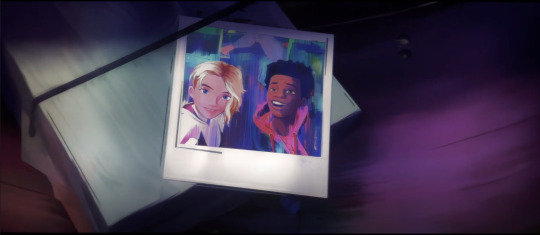
Gwen caring and missing Miles a lot is brought up again when she sees the picture of her and Miles that they made in Into the Spider-Verse (which she had made into a polaroid so she can actually have it on her/in her hands). Her eyes look on with sadness and her color is dark blue. The colors in Gwen’s dimension are used to portray her feelings. Dark/blue tones for sadness and light/pink tones for happiness/comfort. At this point, seeing Miles again is probably one of her dearest wishes. Miles understands her and knows who she truly is. This is going to be important later on.

During Gwens fight with Vulture at the Museum we are introduced to Miguel O’hera, Spider-Man 2099, who saves her from Vulture. He introduces himself but Gwen seems unimpressed and uninterested. What she is very much interested in, though, is Miguel’s Dimension Watch. “You can go to any dimension you want with that watch?” She just met an entirely new Spider-Man and all she is interested in is his technology that might allow her to go and visit Miles. That is how much she misses him.
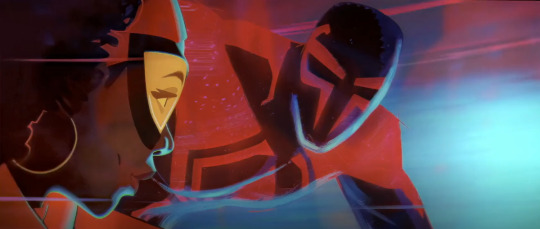
As the duo fight off Vulture Miguel calls for back-up and they are joined by Spider-Woman Jessica Drew. Her and Gwen have an immediate bond which will be very important later on. Gwen immediately looks up to her and sees her as a mentor from who she can learn a lot. Gwen impresses Jessica so much that she asks Miguel if they want to recruit her for Miguel’s Spider-Society. “What about her?” “No.” “Why not?” “You know why.” Miguel and Jessica studied the entire Kingpin collider event. They know who was involved and they know that Gwen and Miles are friends. Miguel doesn’t want to recruit Gwen because she is too close to Miles. Why that is a problem we all know. (Miles being the original anomoly) From the start they knew Gwen’s relationship with Miles might end up jeopardizing their goal of protecting the Spider-Verse.

We then go on to this scene. Gwen confronting her father and her father finding out that Spider-Woman, the vigilante he was dedicated to catching and locking up, is actually his daughter. This is a key moment in Gwen’s arc throughout the movie. Her father accuses her of lying to him. All Gwen wants right now is support from her father. She doesn’t get that, instead her father wants to lock her up for the murder of her Peter Parker. At this point she is immensely conflicted. “I don’t know how to fix this.” Jessica Drew notices that and convinces Miguel to let Gwen join the Spider-Society.


Gwen seeing no immediate solution to her problem decides to accept the invite. She is not yet ready to confront the problem and walks away from it, despite being conflicted. This will be at the back of her head throughout her entire arc and throughout the entire movie. Until she is ready to confront her dad who, remember, wants to lock her up, she CAN’T return to her home dimension. Her going back would mean her having to confront a problem she is not yet ready to confront.
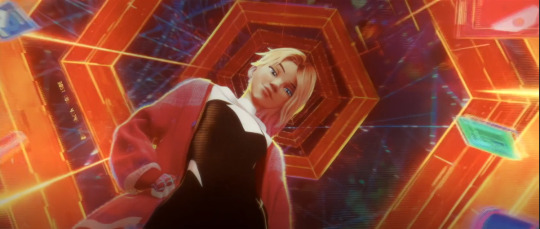
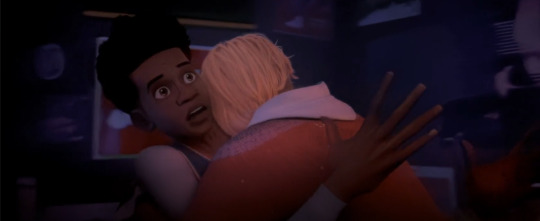
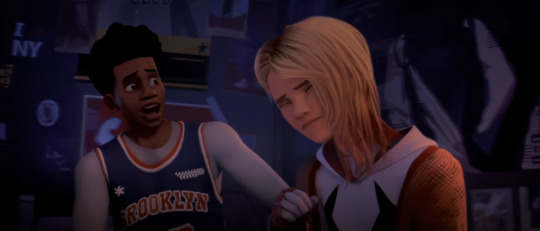
The next time we see Gwen is after we are introduced to Miles again. This is Gwen seeing Miles again for the first time after 1 year and 4 months. Her immediate reaction is to tightly hug him. You can, in that hug alone, see how much she missed him. You can also pick up all kind of little things in this scene. One is how awkward Gwen is. She is cringing at herself for telling him he had a growth spurt. There are obviously some unresolved feelings between the two.

Gwen then goes through his sketchbook and finds Miles’ drawings of her. She is surprised to see so many drawings of her but plays it off smoothly. “Missed you too.” It’s obvious that both missed each other immensely. But we haven’t even seen the entire extend of how MUCH Gwen ACTUALLY missed Miles. We only find out about that a bit later.
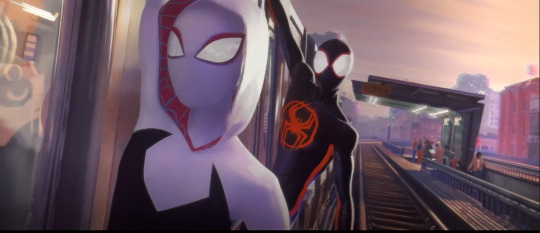
Miles and Gwen then swing through the city and catch up. Their chemistry is on full display here. I absolutely adore this scene. Gwen tells Miles that the Spider-Society is really strict about where she goes otherwise she would have come to visit him sooner. What’s important here is that at this point Gwen KNOWS about Miles’ “condition”. She knows he is an anomoly and she knows that his father dying is a canon event. And at this time she BELIEVES in these canon events. She thinks they must be upheld or the multiverse collapses. That’s what Miguel told her.
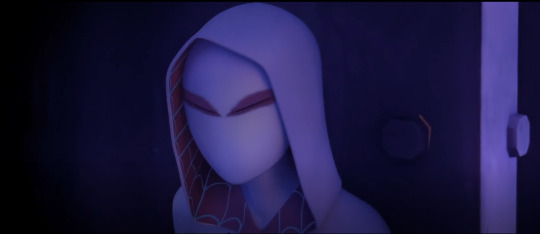
During their swing Gwen uses a moment in which Miles is distracted to place her surveillance device for Spot. You can see, even with her mask, how much it pains her to keep the truth from Miles nd having to leave him in the dark. We find out: Gwen is not here because of Miles but because she is supposed to catch Spot since Spot is an anomoly.


What follows is one of the biggest Gwiles moments in the movie and also a very important scene when it comes to Gwen and her feelings towards Miles. They sit down at the Williamsburgh Bank Building and have a heart to heart.

Gwen tells Miles that it is always so great to talk to him and that he is the only friend she ever really made since Peter died. Miles, knowing about Hobie, says “Other than Hobie, right?” and Gwen answers “That’s different.” This shows us that Gwen’s relationship and feelings for Miles are different from the relationship she has with Hobie. That’s because she literally has feelings for Miles, and she knows that Miles, in some way at least, feels the same. “We’re the same, in the important ways.”
Gwen then says a line that literally shows she has fallen for Miles, otherwise there would be no need for her to mention it. “In every other universe Gwen Stacy falls for Spider-Man.” This is Gwen telling Miles that she has feelings for him.
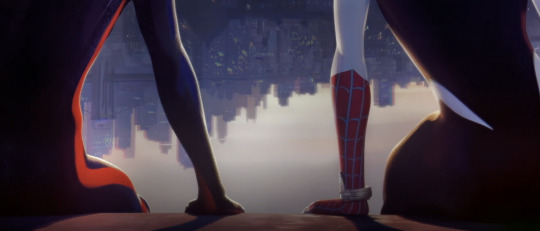
Hearing that reassures Miles and he moves his hand closer to hers.

This is important: Gwen sees this!
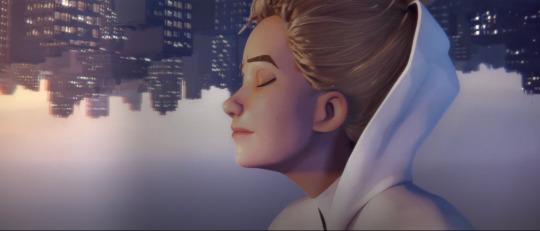
And then closes her eyes and flinches.
She flinches because she wants to take his hand so bad that it literally pains her that she can’t. We find out why she can’t with her next words: “And in every other universe it doesn’t end well.” Gwen knows about canon events and knows they need to happen. She was probably being told that Gwen Stacy falling for Spider-Man and it not ending will is a canon event.

She then gives Miles a look that I can only describe as “loving”. She would probably love to tell him more about canon events and everything regarding the Spider-Society. But like she said: She doesn’t know how to. She doesn’t want to hurt him and she wants to protect him.
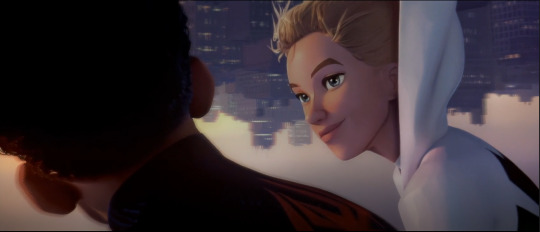
Miles then tells her “There’s a first time for everything, right?” which makes Gwen chuckle and smile at him. It’s the first time where Gwen is confronted with Miles’ philosophy of going down his own patch and not bending to the rules of canon. Even if canon dictates something, Miles believes there is always a way.

This rubs off on Gwen as she affectionately leans on Miles, enjoying the sunset with him.
Not only is this overall scene incredibly beautiful and masterfully animated but its purpose is to show us that these two indeed love each other. They want to be together but Gwen, at this stage, feels like canon is against them.

Miles and Gwen then enjoy some food in quiet and keep talking about the Spider-Society and how Miles wants to be a part of it. Gwen, without being able to tell him the truth, shuts him down and lies to him. Again, she is not ready to tell him everything, the same way she is not ready to confront her father. These 2 conflicts go hand in hand as they are her 2 biggest conflicts that she has to overcome. Gwen then snaps at Miles because he was about to find the surveillance footage of Spot which would therefore uncover her true reason for being there. Gwen obviously doesn’t want that to happen because she doesn’t want to hurt Miles. She wants to keep him away from the Spider-Society because she knows he is an anomoly AND because she knows he wouldn’t be safe there.
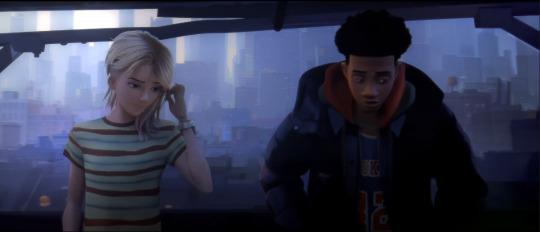



After she snaps at him she immediately apologizes though. They both get REALLY close after that, closer than I had remembered from my first viewing. They also lock eyes. I’m pretty sure if not for Rio, Miles and Gwen would have kissed here. Rio interrupts them and they have an awkward talk. Rio and Jeff obviously think there is something going on between Miles and Gwen which is the source of the awkwardness.

Gwen then gets a signal from her dimension watch which is caused by the explosion that Spot caused. She missed her time window to catch him because she was having so much fun being around Miles. Gwen quickly leaves after that, having to lie to both Miles and his parents.
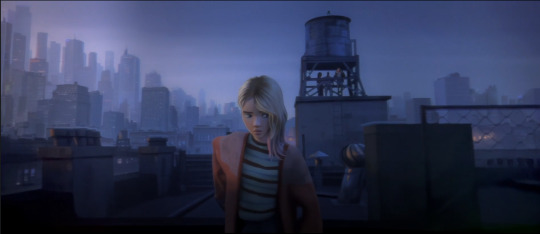
You can tell she doesn’t want to leave Miles. She wants to stay, but she can’t. She is conflicted. And she is conflicted throughout the entire movie. That makes her arc so interesting.
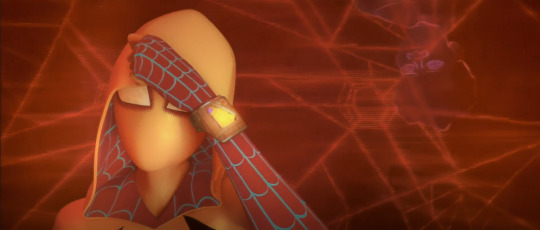
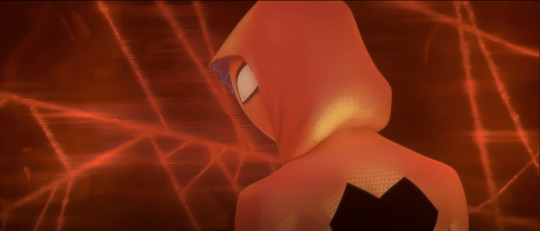
What follows is one of the most important interactions in the movie that show Gwen’s motives. She arrives at the explosion and realizes Spot escaped. Jessica Drew, who Gwen looks up to, remember, calls her and asks her where Spot is. Gwen tries to play the whole situation down, not wanting to be seen as a failure. That has one big reason: Since Gwen is a liability to the Spider-Society because of her connection to Miles she has to constantly prove her worth, otherwise Miguel will send her back to her universe. That is one of Gwens biggest fears. Having to confront her father again. She is not yet ready for that so she basically does everything that is asked of her, even if she doesn’t necessarily agree with it.
Jessica notices that Gwen is nervous and asks her if she visited Miles. Gwen again tries to play it down but eventually admits she went to see Miles. Jessica gets angry with her and Gwen tells her she will never see Miles again. Her voice noticeably breaks when she says that.
That interaction tells us one very important point: Gwen was not allowed to visit Miles. AT ALL. Miguel has forbidden Gwen to see Miles. He probably also told her why. Miles is an anomoly and him getting entangled with the Spider-Society might end up badly.
And Gwen, knowing all that, knowing she might risk the multiverse, knowing she might risk getting sent back to her own dimension and having to confront her father, STILL decided to visit Miles. That is how much she cares about Miles. She literally risked the stabilty of the multiverse for the opportunity to see Miles again. Even if its only for one evening. This alone should end the debate about how Gwen “doesn’t care about Miles”. She obviously does. A lot.
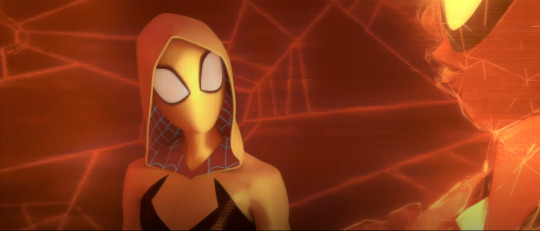
This can be taken even further.
“You never made a mistake? Never got too close to someone?”
This is literally Gwen telling Jessica that the reason she went to see Miles is because she has feelings for him. Jess replies by saying she did but that she got over it, prompting Gwen to do the same. We, of course, know that she can’t.
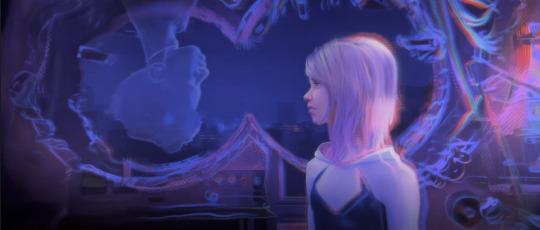

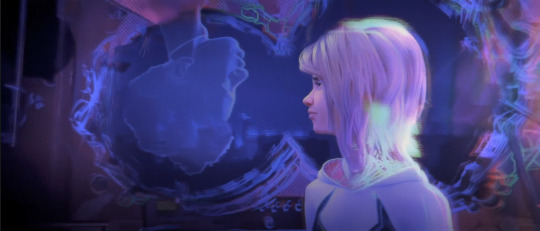
This is one of the most emotional scenes in the movie for me. After Gwens dialogue with Jess she knows her only chance to stay on Miguels good side is to follow Spot to Mumbattan and catch him. She has to leave and knows she will never see Miles again. She longingly looks towards the rooftop she and Miles stood on just moments ago, not knowing Miles is invisible and right in front of her.
She whispers a last “Goodbye Miles” as she heartbreakingly decides to leave. As much as it pains Gwen, she thinks leaving now without explaining anything to Miles might hurt him, but it does keep him safe and away from the Spider-Society. It’s a lose lose situation for Gwen. She is fighting a losing battle. On one side she has Miles and the desire to be with him, on the other side the entire Spider-Verse and the conflict with her father. The fact she is even contemplating shows how loyal she is towards Miles.
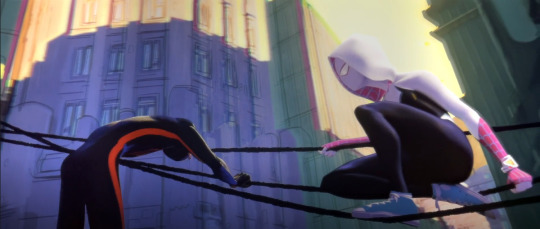
Miles follows her through the portal and catches her off guard. Gwen didn’t know he was listening and thought she would never see him again. Miles, being in another universe without a dimension watch, glitches and endangers both him and Gwen. Gwen then says that she “never should have visited” Miles.
She obviously meant the fact that NOW Miles is involved and they can’t go back now. She didn’t want Miles to be a part of it and now regrets that she pulled him into this. She is more angry at herself than at Miles here.
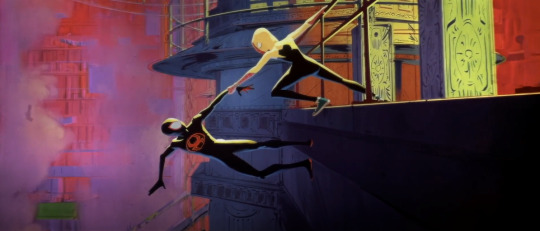
When the canon event approaches Gwen tries to stop Miles from disrupting it. Again, a lose lose situation for Gwen. She knows (or at least thinks at this point) that disrupting canon events can cause universe to unravel. She also knows how dangerous canon events are and that there is a good chance Miles might die if he tries to intervene.
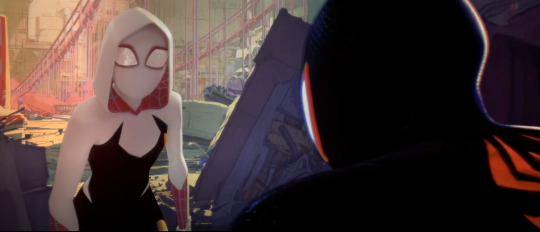
Miles, not knowing about canon events at all yet, intervenes anyway. (Because he is Spider-Man, duh) While trying to save Captain Singh and the little girl he gets covered by rubble. Gwen and Hobie go down to the scene and while Hobie immediately helps Pav to pull up the bus Gwen literally makes a dash for the rubble and tries to find Miles. All the while screaming his name, her voice breaking while doing so. The relief in her voice when she finds him alive and well is very noticeable. (Great voice acting by Hailee Steinfeld)

After disrupting the canon event, Miles asks Gwen what she thinks of the situation. Gwen, almost affectionately whispering to him, tells him that she always thinks that he is amazing. Another moment that makes these two get closer and it shows how much admiration Gwen has for Miles. Even after disrupting a canon event, Gwen thinks the world of Miles.
This highlights her conflict again. While still believing in these canon events, Miles is slowly but surely changing her mind about them. He is not quite there yet but it’s coming.
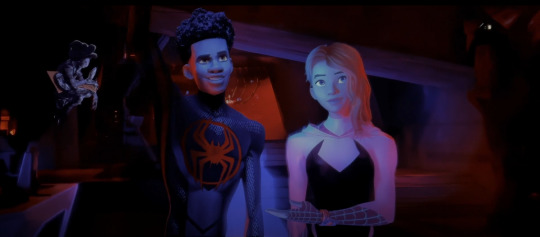
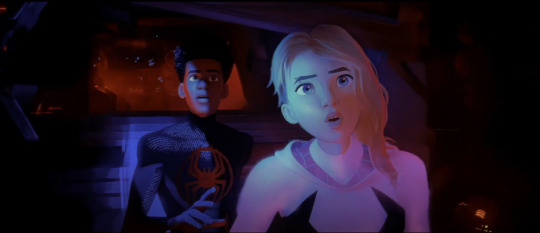

We then go the Spider-Society HQ where Gwen introduces Miles to Miguel. Miguel immediately becomes hostile and blames Miles for disrupting the canon event. Gwen knows that Miles did in fact disrupt the canon event but still defends him.
“He doesn’t know any better:”
Miles has no knowledge about canon events or anything related to it so he can’t be blamed for what he did. Gwen knows that, which is also a reason why she tried to stop him.

Miles then finds out about the structure of the Spider-Verse and about canon events. Miles also finds out that Gwen did not only try to save him but also stop him from disrupting the canon event.

When Miles finds out his fathers death is a canon event that has to occur you can see Gwen frowning. She knew this and now Miles knows it.
There is no easy way to tell that to someone. Not if you’re close friends and not if you haven’t seen each other for a year. It pains Gwen that Miles has to go through that, and on top of that she can relate to it as well, because...
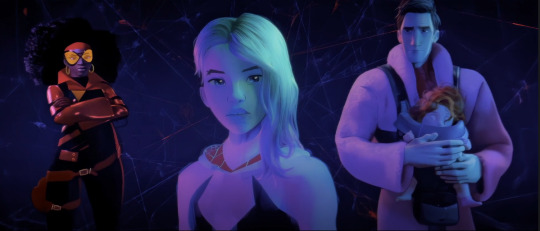
... Gwen’s father is also a Captain who’s death is a canon event. This adds another layer to her inner conflict. She believes in these canon events and therefore also believes that her father has to die. Gwen, in that aspect, is similar to Miguel. She accepts it, runs away from it. Similar to how she runs away from the conflict with her father.

Miles confronts the other Spider’s and tells them he can’t sit back and let his father die. He then tells Gwen, referencing her earlier statement, that she was right and that she never should have visited her.
Miles does NOT say that because he hates Gwen. He says that because he is distraught and because of the fact that if Gwen hadn’t shown up he’d still be in his dimension. (Where he wants to be to protect his father)
Gwen starts to cry because this is OBVIOUSLY not how she wanted it to go and how she wanted Miles to find out.
The fact is: There was never a right time or way to explain it to Miles. Gwen isn’t an emotionless puppet that never struggles or is perfect. She loves Miles and she simply couldn’t bring it over her heart to tell him that his father will die and that he isn’t supposed to be Spider-Man. She wants him to be happy and to be safe, and from her perspective the best way to do that is to keep him away from the Spider-Society.

When Miguel traps Miles to stop him from going home Gwen and Peter get really agitated.
“That’s enough.” “Stop it Miguel.”
They don’t want to be on opposite sides to Miles. They want to talk it out. Of course the chance for that is now gone. You can still see that both still very much are on “Miles’ side”.
Gwen is put into a situation where she is forced to choose between her friend or the Spider-Society.
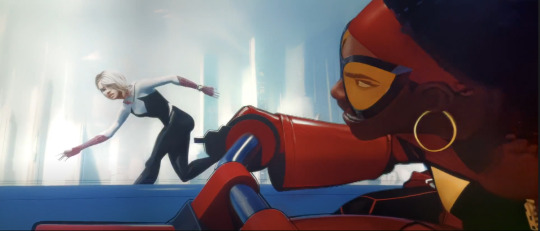
While they chase Miles, Jess confronts Gwen and tells her that even though Miles is Gwen’s friend, capturing him is the only way.
Gwen then tells Jess that that’s not what her gut says.
This, again, shows her conflict. She KNOWS she is supposed to be on Miles’ side. It’s what her gut is saying. It’s what her heart is saying.
Her head is still thinking that the multiverse must be protected, and that canon events must be stopped from being disrupted.

She then listens to her head and tries to grab Miles with her web. The look on her face says it all. It’s pain, love and an apology all in one. Miles destroys the web, symbolic for their trust.
Miles breaks the net, he is saying that he doesn’t trust Gwen anymore.
Gwen knows that, which is why after Miles breaks the net her look is one of complete sadness and disbelief. Not disbelief because she couldn’t imagine Miles not trusting her but rather diesbelief because she can’t believe it has come this far.
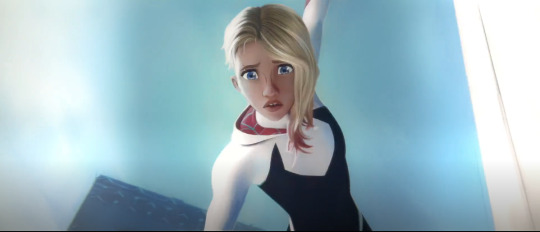

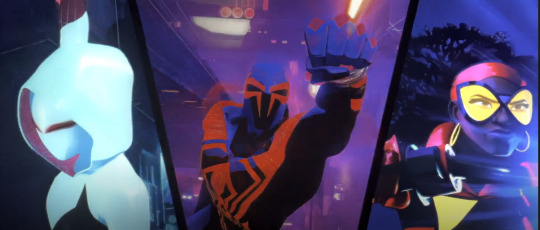
She continues the chase for Miles because she doesn’t know what else to do. When Miguel calls for every Spider-Man after they found out Miles’ location you can see Gwen having a look of dread and defeat on her face. She did’t want it to go this far. She still wants to talk it out and make up with him. She feels sorry and is slowly starting to regret her choices.
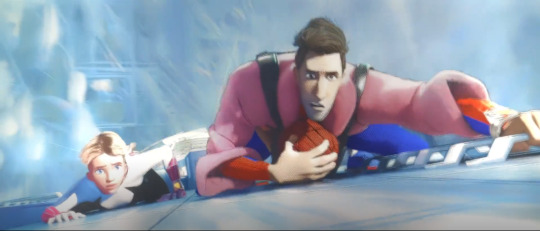
While on the train Gwen and Peter keep calling out to Miguel, telling him that he should stop and to take it easy on Miles. Miguel doesn’t listen.


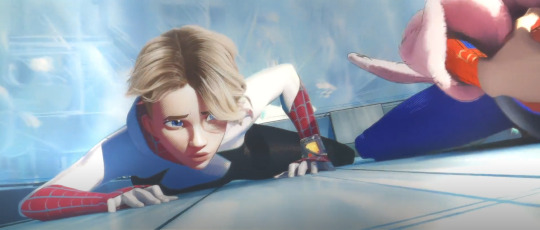


This scene is where the trust between Miles and Gwen is broken completely. Miles finds out that Gwen knew all along that he is an anomoly and that his father is supposed to die. He finds out that Gwen didn’t know how to tell him that and that that’s one of the reasons she didn’t come to visit him.
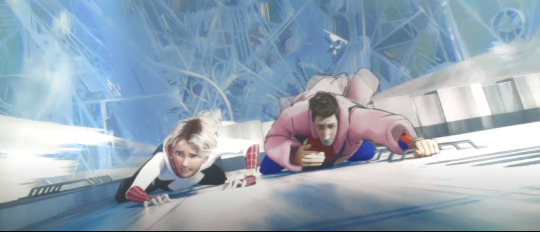
Gwen then tells Miles that its for his own good, a lie she told herself to make her feel better. She full on regrets her choices by now. She knows she made a mistake but feels too distraught to really do anything about it. Her world slowly comes crashing down on her.
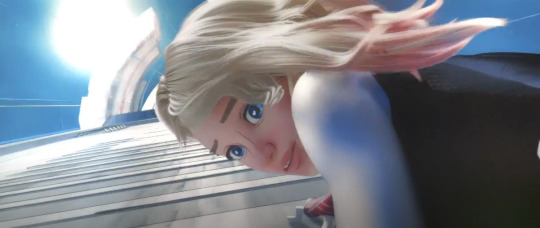
Miles is able to overpower Miguel and sends him flying down the train. The way Gwen looks down at Miguel is really interesting. Its a look of pride and relief. She is proud of how far Miles has come that he is able to escape from Miguel and reliefed that he was actually able to.

While Gwen thinks that now the way is free for her and Peter to get to Miles and explain everything to him, Miles just gives them a look of hurt, sadness and betrayal. He then says “Goodbye Gwen”, again mirroring Gwen’s goodbye earlier in the movie. Both were sad but for very different reasons.

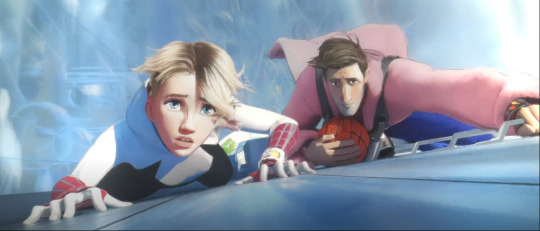
The change of expression from Gwen says it all.
This goodbye from Miles, in his eyes, is final. He feels betrayed and hurt and just wants to get home to save his dad. While Gwen and Peter probably want to just talk to Miles and explain everything, Miles may think they want to capture him, too. And Miles can’t take that chance.

After Miles decides to jump Gwen, again, has an expression of relief on her face. This time the relief is because Miles managed to really escape Miguel and the other Spiders. She knows Miles will be safe, for now.


Miles manages to escape and Gwen is furious with Miguel. Furious as to how he treated Miles and how he managed the whole ordeal.

She speaks up and Miguel blames Gwen for the Spider-Society losing Miles.
This is where Gwen starts to see that she actually doesn’t have the Spider-Societies back and that she should have taken Miles’ side from the beginning. She slowly realizes the true extent of her mistake.
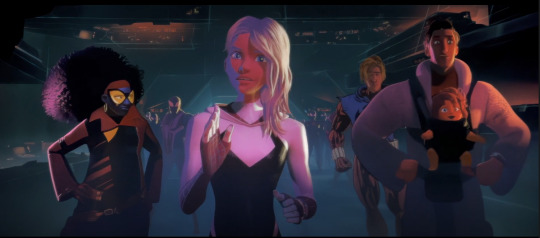
Gwen then proposes to talk it out with Miles, on her own. Miguel refuses, saying they tried that already.
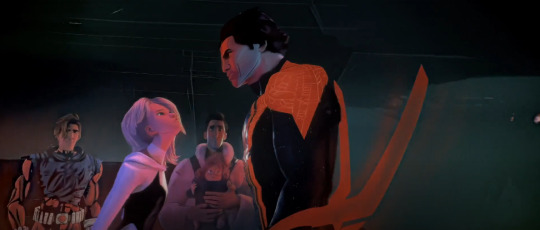

She goes on to tell that Miles is her friend and is starting to question the whole “Canon event” topic.
“Do you know for certain what happens when he breaks the Canon?”
She is starting to fully side with Miles.

Miguel tells her he knew from the beginning that her relationship with Miles was a liability. Gwen looks to Jess for support but doesn’t get it. She is now on her own, same as Miles.

Gwen gets sent to her home universe, the thing she dreaded most. The last thing she tells Miguel is that they are supposed to be the good guys. That shows where she stands in regards to the conflict inside herself. She now knows that what Miguel and the Society does is wrong.
She was on the Society’s side, now she is on Miles’ side.
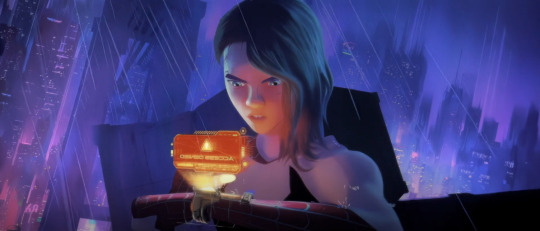
She immediately tries to go to Miles’ dimension but she is locked out from using the dimension watch. Miguel denied her access. Gwen is furious and now trapped in her home dimension.
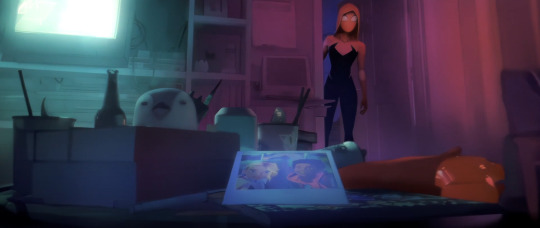
She returns home and wants to collect the polaroid of her and Miles. She doesn’t want to confront her father yet, but we all knew it was inevitably coming.
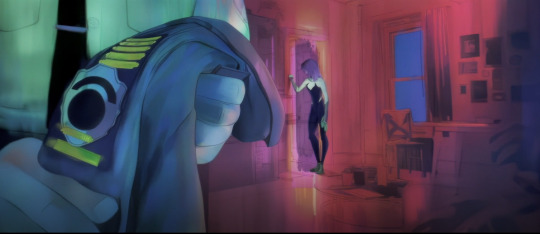


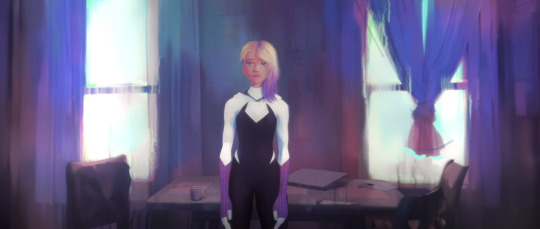
Gwen confronts her dad and opens up to him. She pours her heart out and tells him how she really feels.
Remember, Gwen is a 16 year old girl. She carried the burden of her rensponsibility and the conflict inside her while still always trying to do the right thing.
But she says it best in this scene, “She doesn’t know what right or wrong is anymore.”
The entire time she believed these canon events to be absolute and followed through with the Spider-Society’s plans because she thought it was the right thing to do.
In the process she hurt and betrayed the only real friend she had. And that was the straw that broke the camels back. Her intentions are now clear.

“I can’t lose one more friend.”
She doesn’t know whats right or whats wrong, all she knows is that she can’t lose Miles.
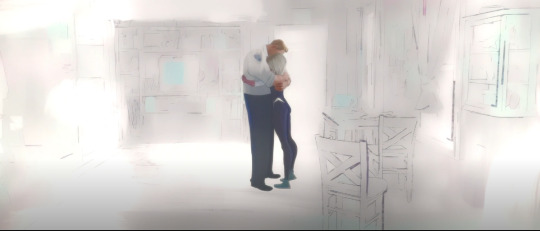
During her speech her father decides to quit his job as captain, freeing him from the canon event. This is when Gewn realizes that canon events might not be absolute and that they can be disrupted without dooming the dimension.
She realizes Miles might have been doing the right thing all along.
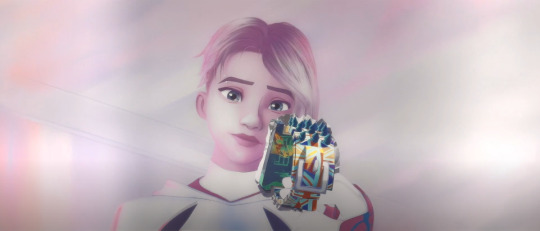
After making up with her dad the only thing left to do for Gwen is to go and find Miles. With the help of Hobie’s watch that is actually possible now.

Gwen arrives in Miles’ universe and finds out that Miles is in the wrong universe. She overhears Rio and Jeff talk about Miles. They mention Miles lighting up when he is around Gwen and that they hope she doesn’t get him hurt.
This is where the full realization of her actions become clear to Gwen.
She hurt Miles and didn’t help him when he needed her the most, and she hates herself for that.
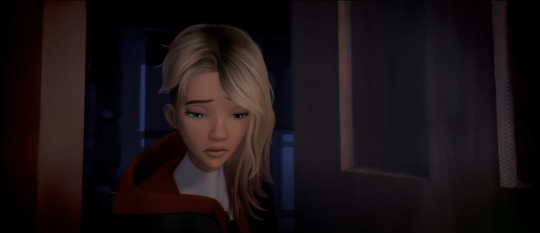
She blames herself for what happened to Miles, even though it is not her fault entirely.

Gwen tells Rio and Jeff that she is going to find Miles and bring him back.
She also tells them what she learned from Miles.
“All is possible.”
This is the lesson Miles gives Gwen in this movie. It is a lesson she needed to learn. She now fully believes that anything is possible. This will come into play in Beyond the Spider-Verse when they are going to try and stop canon events from happening.

She resolves the conflict with her father, parts ways with the Spider-Society and has only one goal left now:
To find and make up with Miles.
In her arc Gwen faced the conflict of choosing her friend or the greater good. On one hand is Miles, who she obviously has feelings for. On the other hand there is the Spider-Society who tell her how the multiverse works and how dangerous Miles and other anomolies are. In the end, her friend won, though it was a harsh process that damaged their trust and relationship.
Gwen is not perfect and isn’t always right. She is a 16 year old girl with tons of complex conflicts going on. She fights a constant battle with herself and her feelings. She makes mistakes, as do Miles, Peter, Miguel and the others. The important thing is that Gwen learns from these mistakes.
This also shows that she doesn’t hate or not care about Miles like some people have said. If anything her actions show to which lengths she went for Miles to be safe.
She knows she hurt Miles and is going to make up for it in Beyond the Spider-Verse.
#across the spiderverse#Spiderverse#gwen stacy#miles morales#spider man#spider gwen#spiderman#gwiles#miles x gwen#miles and gwen#ghostflower#beyond the spiderverse#across the spiderverse spoilers#spiderverse spoilers
2K notes
·
View notes
Text
art piece within a museum labeled "a story about your life". you go inside, and it's a tablet and a chair. you sit down and look at the tablet. it reads, "you are human. you enjoy art, especially strange and challenging art." it goes on similarly listing vague generalities. just as you being to understand your takeaway from the piece, that we are all broadly similar, or at least more similar then we are different, it states your exact time of birth. perhaps this was the twist, you think, they took your date of birth from when you bought a ticket and used cameras to pick out which date of birth to display. except it keeps going. it recreates bits of your childhood you don't even remember in perfect detail. it is critical of your actions in highschool, and how poorly you treated your first partner.
it keeps on going. it insults you for stealing food from your coworkers, and tells you that your mother wanted to tell you that she was sorry before she died. it writes a detailed, step by step explanation of how you got into this booth this right now, and it's all true.
it keeps on going, telling you of catastrophe. you will die in a year from a stray bullet and after you die the world will go to hell. the worst atrocities now are only the precursor to what is to come. there will be no humans left alive in 50 years from now.
you leave the museum in a rush and get home, sobbing. you spend the last year of your life drinking and destroying your relationships. you scream about the end of the world and no one is listening. you barely manage to hold on to your shitty day job, if only so you can buy more drink.
the appointed day of your death comes and you hear a knock on the door. you have accepted what is coming. you open the door. there is a package. you quickly open it up. it is a poster, a thomas kinkade painting. it has the quote "you never know when you will die, so remember to always live life to the fullest." it is attributed to gandhi.
#yellowed pages#unreality tw#just in case idk some people don't like second person#wrote this on the toilet so it's literally a bit shit lol#might edit this later but it's probably without spelling mistakes maybe
538 notes
·
View notes
Text
The Oxygen Breathers: With one hand tied behind my back!
The human sat on the bench in the common area for at least one of their hours before the children worked up the courage to approach.
"You're a human right?" One of the children - an Innari - said as they approached the human. They were taller than the human, and seemed to have barely any bones. They moved and undulated like an octopus that was used to being out of the water.
The human's helmet flashed an cartoon icon of its face and smiled - without their teeth - broadly. "That's right! My name is Harold, but everyone calls me Harry. What's your name?"
"I'm Opian, this is Downward Draft, and standing in the back is Vizxxian." They gestured with their tentacle-like appendage. It had manipulators on the end which could be seen a little like fingers. Good for fine detail work.
Harry put up his gauntleted hand and spread his fingers. A wave. "It's a pleasure to meet you all. What can I help with?"
"Downward Draft says humans are the strongest of the Coalition peoples. Is that true?"
Harry sat up slightly. His icon continued to speak while he did. "Well, I don't rightly know if that's true, Downward Draft. I haven't met everyone. Of the ones I did meet, I have a hunch I might be stronger, but you also have to remember, we come from a heavier world than most of the other Coalition species. Earth's gravitational pull is half again what it is here on this station.
There were gasps and noises of surprises from the kids. "That's so heavy!" Downward Draft rustled their feathers they caught the light and sparkled. "This station is already heavy for us; our homeworld's gravity is even less. I bet I couldn't' even walk on your planet!"
Harry's icon nodded. "You might be right, Downward Draft. But, gravity aside, it's nice here. I like the colors you use to decorate, and I like your plants. Everything back home is just different shades of green."
Vizxxian was working themselves up for something. Harry peered over Opian's head. "How about you? Do you have a question?"
Viz's eye slits squeezed shut and they blurted out "My parent says you're all a bunch of 'rock throwers' and that we should have never let you into the Coalition. They say that outside of your suits and ships, you're not so tough."
Downward Draft nudged Viz. "Don't be mean Viz! Harry is a guest here. You know how to treat guests."
Harry chuckled. "It's all right Downward Draft. We learn things from our parents. Part of growing up is trying to figure out what is true and what isn't. Now, I'm not mad, but you know that 'rock throwers' is a slur, and not a nice thing to say, right?"
Viz's ears wiggled in assent. "Yes, but that's the word father used. I know it's a bad word though."
Harry nodded. "Context is important though. I could say 'I picked up this rock and threw it' and that's not a slur, but if I said 'those rock throwers always go back on their deals' that is a slur. It's all right though, I'm not angry." Harry's helmet cleared. The kids looked across as his face became visible for the first time. Opian's eyes dilated in surprise. "So your dad thinks that we're not so tough outside of our suits? How about we place a little wager? I'll get out of my suit, and if any of you can touch my arm, I'll buy you a snack."
Opian shrinked back. Downward Draft raised their feathered arms in a gesture of dismissial. "You can't breath the atmostphere here! You'll die!"
Harry put up a hand. "It'll be all right. I'll wear a breathing mask, and the pressure and atmosphere difference won't hurt me for the time I'll be out of the suit."
"Oh we couldn't-"
"I'll do it!" Opian and Downward Draft turned in shock to Viz. They had stood to their full height, just a little taller than Harry and bent their legs just a little. "I can touch your arm."
Harry grinned. "Good. Let's see." Harry stood up, and touched the pad on his suit's arm. There was orange light that illuminated his face and he frowned and pressed more buttons on his suit. After a moment, it turned green, and lines appeared all over the suit. Joints. With a hiss of pressure and a whine of servos, his suit unfolded like a flower, and Harry stepped out.
He was much shorter than the kids. Just two meters tall if that. On the top of his head was a dark fur that was closely cropped, and he had fur all over the lower part of his face that was the same color. Under the outer, armored suit he wore a tight body suit that connected to the outer suit with thin wires. Harry reached down and unplugged them and they slid up into the suit he was wearing and disappeared. Opian was impressed. Their suits seemed to be far more advanced than ones of Innari make.
"There." Harry's voice was much lower than his translator made it sound. Maybe it was the difference in breathing gas? It was also a little muffled by his mask. "Okay Viz. Whenever you're ready."
Opian and Draft stood back and watched. Viz stood stock still and seemed like they were trying to decide what to do. Suddenly, Viz howled and ran towards Harry. Their long legs consumed the distance between them relentlessly. At the last half meter, Viz spun and in one fluid motion bend down and lashed out with one of their legs. Opian gasped. He was attacking Harry! That's a lethal kick if it connects.
Before Opian could react any further, Harry... wasn't were he was before. He was standing a meter to the side, and Viz was flying backwards into the bench. Viz jumped up, and roared again. This was a roar of frustration as well as a battle cry, and charged Harry. Once again, Harry stood there watching, and as Viz turned to kick him, he wasn't were Viz expected, and they went skittering across the smooth floor.
Harry stood with his hands on his hips. His eyes flicked to Opian and Draft. "Remember, strength isn't everything. Know your opponent. Know how they attack, watch for signs, paying attention and then you can move out of the way and dodge." Harry was grinning and put his hand out and curled his fingers towards himself. "Come on, Opian, Downward Draft, you try too!"
Downward Draft bent low and leapt towards Harry, using their legs to absorb as much potential energy as possible, releasing it as they sprung towards him with arms outstretched. Quicker than Opian could follow, Harry ducked underneath the Avar, and Draft sailed harmlessly overhead.
Harry, looked at Opian and raised one of the small lines of hair above his eyes. "What about you, Opian? Give it a try?"
"No, thank you Harry. I concede. There's no way I could touch you."
Harry's nodded. "That's all right. Mayb-"
Harry looked over and Downward Draft was standing mere centimeters away, with his arm out, and the barest edge of one of his iridescent feathers brushed against Harry's arm.
"Got you." Draft whispered.
Harry tipped his head back and laughed. The kids all took a step back in fear. "No, no, it's all right. that's a fair touch. You win, Downward Draft. I'll buy you snacks. Just let me get back into my suit. My skin is starting to itch."
It only took a moment for Harry's suit to climb onto him and fit around him as he stood there. "I have to say Downward Draft, you can move quietly."
They ruffled their feathers in pride. "Thank you Harry. On my world, moving without noise is a prized skill."
Harry darkened his helmet and his icon re-appeared. "Harry?"
He turned, "Yes, Viz?"
"You don't have to darken your helmet. We don't think you're scary anymore."
Harry's helmet cleared. He smiled without showing his teeth. "I'm glad to hear that Vizxxian. I'm glad to hear that."
#humans are deathworlders#writing#humans are space orcs#humans are space oddities#jpitha#sci fi writing#humans and aliens#humans are space capybaras#humans are space australians#The Oxygen Breathers
664 notes
·
View notes
Text
I was never really certain about my transition in the way that most gatekeeping hormone prescribers and curious members of the public demand that a trans person be. I didn’t “always know” that I was not cisgender. I haven’t “always known” anything about myself. Very few truths about me have always remained true, my existence is too interpersonal, contextual, and ever-evolving for all of that. (So is most everyone else’s, I think). I don’t think that the fact I’d eventually choose to exercise my body autonomy at age 30 by taking hormones is a decision I could have foreseen when I was a child.
All that I knew about being transgender when I was a kid was a fact that most children intuitively know: gender assignment was a violation of my freedom, of everyone’s freedom in fact, and it was wrong. As an infant and then a child and teenager, people kept imposing labels on me; they kept forcing me and my body into prescribed gendered boxes, and while the specific labels and boxes never really felt like the right ones, the most disturbing part about it all was the forcing. No coerced identity would have ever felt right.
Children can tell when secrets are being kept from them, and when adults are restricting their choices. They notice that they and the other children are being lined up boy-girl, boy-girl, without ever being told what a girl or a boy even is. They can see their parents frowning when they reach for the doll with the shimmery hair, or climb atop the neighbor kid on the playground. Kids know that they are forbidden from sitting with their legs spread wide or flicking their wrist, and their gender illegibility is shamed in them, long before they get any answers about what gender means or where it comes from or why it’s so important that they make themselves easy to understand.
Like the cloned children in Never Let Me Go who grow up being conditioned for a life of forced organ donation, children in a cissexist society grow up conditioned to fall within certain gendered boundary lines, and by the time they learn that the reason for this is almost completely arbitrary, they can’t imagine any alternative. Not until some of them hear about gender transition and find the prospect very compelling, for some reason.
You can say that reason is because some of us are inherently trans, but there’s absolutely nothing in the way of brain science, genetics research, or even sociological data to back that up. Besides, the search for a biological “reason” that people are transgender or queer runs counter to the goal of queer liberation in the long run. Science only needs to explain the existence of transgender people (or queer people more broadly) if our existence is in some way aberrant or a problem.
If queerness is accepted as a form of human diversity that simply exists, then there is no need to excuse it by claiming that it is never a choice. It can be a choice, if a person wants to make it, and hopefully it satisfies them, but maybe it won’t. Freedom to choose means freedom to forever be dissatisfied, to search endlessly for more, and yes, to capable of making a mistake.
I would say that viewing myself as transgender was a choice. I decided to break away from the straight, female categories to which I had been assigned, and doing so allowed me to view the legal and societal power structures that had restricted me more clearly. It helped me better understand myself. But that does not mean the actual act of breaking away was always the truest reflection of who I am.
The version of me that transitioned was a person on the run — and how a person behaves, thinks, and self-conceives when they are fleeing is not a great reflection of whom they might be if they were safe. If we all lived in a world free from mandatory gender assignment, and where our bodies were not mined for meaning about the kinds of sex we liked, the clothing we should wear, the personality qualities we have, the roles we should play in society, and the connections we are allowed to form with others, who knows who each of us might be.
But none of us get to live in that world, or ever gets completely free from the frameworks of heterosexuality and the gender binary. These frameworks shape every legal institution we encounter, every school we attend, every item of clothing we put on, every substance we take into our bodies, every piece of paperwork that ever gets printed about us, and every look another person ever gives us. And so we make due with rewriting and recombining those frameworks as best we can.
It should come as no surprise that those us who break away from the binary have to experiment and revise how we understand ourselves quite a bit — sometimes getting things “wrong,” sometimes searching forever for the semblance of something “right.” Sometimes reveling in the “wrongness” of all the available options is kind of the point.
I wrote about my detransition, retransition, and the eternal dissatisfaction that is probably the corest truth of my identity. It's free to read or have narrated to you on my Substack.
297 notes
·
View notes